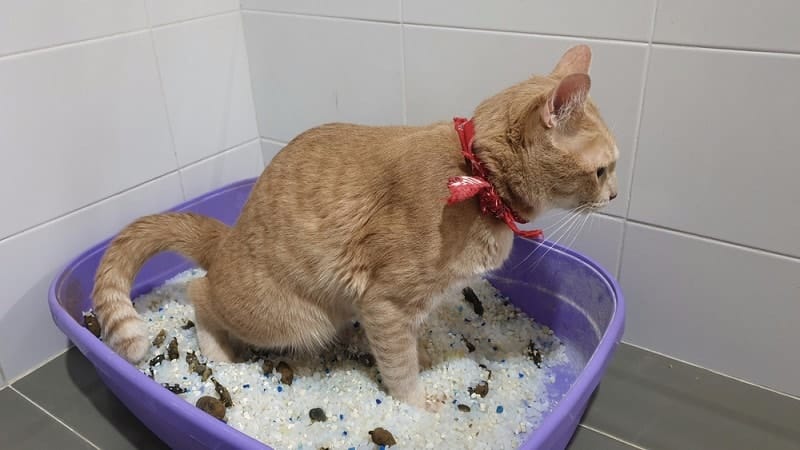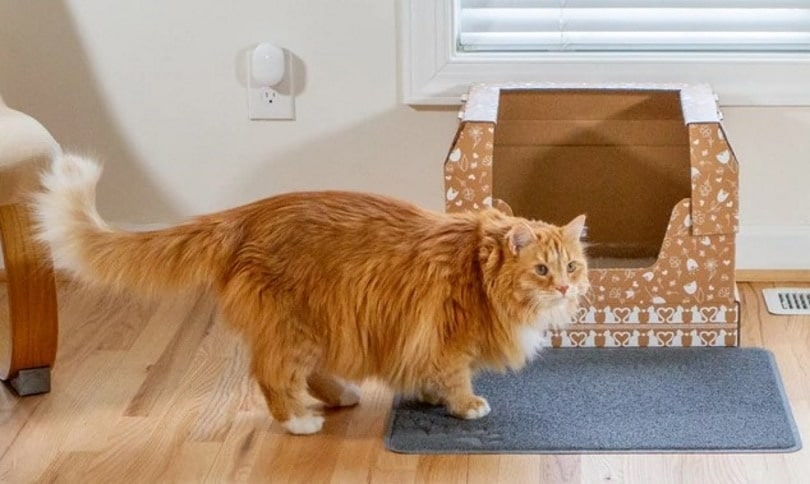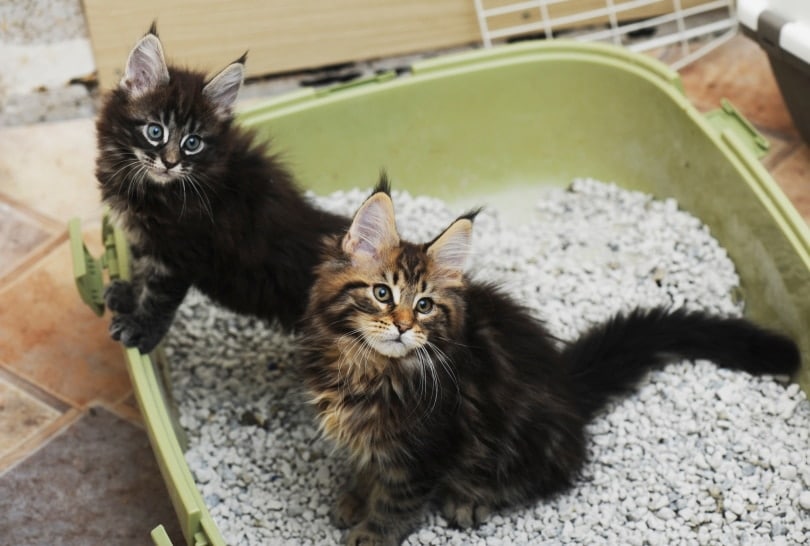
In this article, we’ll review some of the best eco-friendly litter boxes and the pros and cons of each box. That way, you can find a litter box that fits your needs and makes you feel confident about your choice as well.
A Quick Look at Our Favorites in 2024
| Image | Product | Details | ||
|---|---|---|---|---|
| Best Overall |

|
Kitty Poo Club Delivery Service |
|
Click to Save 35% Use code CATSTER35 |
| Best Value |

|
Frisco Stainless Steel Cat Litter Box |
|
CHECK PRICE |
| Premium Choice |

|
Litter One Biodegradable Cat Litter Box |
|
CHECK PRICE |
| Best for Kittens |

|
Littermaid Disposable Litter Box |
|
CHECK PRICE |

|
iPrimio Stainless Steel Cat Litter Box |
|
CHECK PRICE |
The 7 Best Eco-Friendly Litter Boxes
1. Kitty Poo Club Delivery Service – Best Overall

| Material: | Recyclable material |
| Dimensions: | Different depending on the size |
Kitty Poo Club Subscription Service is our top pick for the best eco-friendly litter boxes. This unique company allows you to swap out your litter box on a monthly basis without adding any additional waste or plastics to the environment. Their secret is a recyclable litter box conveniently delivered to your doorstep with a fresh bag of litter each month.
With Kitty Poo Club, you customize your subscription based on your cat’s size and litter needs and can include any add-ons they may need, such as a scoop, litter mat, or litter box dome. Simply choose the bundle best suited for your cat and wait for your package to arrive. Kitty Poo Club also offers free shipping for all of their bundles.
We love the two-for-one with this brand. You are shipped a fresh, environmentally conscious litter box each month, keeping your cat’s bathroom area clean and odorless, and you’ll never have to worry about running out of litter or replacing harsh plastic bins that are typically used.
- Recyclable litter box
- Shipped monthly
- Promotes a cleaner setup
- Subscription service
2. Frisco Stainless Steel Cat Litter Box – Best Value

| Material: | Stainless steel |
| Dimensions: | 4”L x 15.5”W x 5.9”H |
If you are sold on stainless steel and want a slightly more wallet-friendly option, the Frisco Stainless Steel Cat Litter Box will give you the most bang for your buck. This box won’t rust away or break down, so one purchase will last you for years, and the stainless steel is easy to clean. The only drawback of this design is that the side walls are a uniform 5.9 inches in height—tall enough to make older cats struggle to get in the box and short enough that messy cats will be able to make a mess in the area. That being said, for many owners, this box will meet your needs exactly and at a price that’s hard to beat.
- Durable stainless steel
- Long-lasting
- Easy to clean
- Shorter in height and no cover
3. Litter One Biodegradable Disposable Cat Litter Box Kit – Premium Choice

| Material: | Cardboard |
| Dimensions: | 75”L x 14.75”W x 12.25”H |
Most self-cleaning litter boxes don’t work with environmentally friendly litter, so we generally recommend going low-tech. But if you’re willing to pay a little more for a little less work, the Litter One Biodegradable Litter Box Kit is a great premium choice that will make your life simple without compromising your values. Each kit is fully biodegradable and contains a cardboard litter box, pine-based litter, disposable bags, and a cardboard scoop. As the litter absorbs water, it disintegrates into sawdust that will filter into the bottom of the box with a shake. That means you only have to scoop up the occasional poop, simplifying your routine. And then, after six weeks or a month, the whole box can be replaced.
Although there are some drawbacks to manufacturing a whole box every month, the biodegradable nature of this setup makes it a great option for some. Of course, the recurring cost of buying the kit does add up, making this more expensive in the long run than many other options.
- Includes biodegradable box, litter, scoop, and bags
- Makes cleanup easy and environmentally friendly
- Easy sift system
- More expensive option
- Must be replaced regularly
- Some cats and owners dislike the pellet smell
4. Littermaid Disposable Litter Box – Best for Kittens

| Material: | Recycled paper |
| Dimensions: | 37.5”L x 17.125”W x 6.25”H |
Generally speaking, a disposable box isn’t our favorite choice. After all, throwing a box in the landfill regularly isn’t ideal, especially if it can only last a few uses. Despite that, we found the Littermaid Disposable Litter Box a great choice for kittens who don’t need a permanent setup or don’t yet have a need for a large, permanent box. Made from recycled paper, this box is easy to use and throw away, and since it is fully recycled and fully compostable, it won’t clutter the planet. This box is on the small side, making it less than ideal for large cats, but its benefits mean that there’s a time and a place where this is the best option.
- Low cost
- Easy cleanup
- Made from recycled and compostable materials
- Requires frequent replacing
- A little small
5. iPrimio Stainless Steel Cat Litter Box – Best Overall

| Material: | Stainless steel and plastic |
| Dimensions: | 5”L x 15.5”W x 12”H |
When it comes to environmentally conscious litter boxes, it’s hard to beat stainless steel. It is long-lasting and durable, making it unlikely you’ll have to replace it. Unlike plastic, it won’t stain or crack. It also won’t absorb odors. All these factors make the iPrimio Stainless Steel Cat Litter Box an easy choice for an eco-friendly litter box. This large litter box comes in at 23.5 by 15.5 inches, making it perfect for cats of almost any size. Four rubber feet help keep it securely in place on the floor. It also comes with a removable splashguard that is helpful for cats who spray high or scratch litter everywhere. Although it’s not completely plastic-free, it’s still a great choice that will meet your cat’s needs forever.
- Durable stainless steel
- Easy to clean
- Long-lasting
- High walls
- Plastic hood/splash guard
6. Petmate Booda Clean Step Cat Litter Dome

| Material: | Recycled plastic |
| Dimensions: | 5”L x 22.5”W x 19”H |
If you prefer a covered litter box, the Petmate Booda Clean Step Cat Litter Dome is a great option. Although it is made out of plastic, 95% of the materials in the design are recycled, making it more environmentally friendly than most litter boxes. A replaceable charcoal filter cuts down on odor. It also has an attractive domed design, with steps in and out that stop your cat from tracking litter all over the house. It is a little on the smaller end, though, with an exterior diameter of 22.5 inches and the stairway cutting down the actual “box” to an even smaller space. Although the box is sold as being easy to clean, many reviewers disagreed, saying that the curved opening made it hard to keep the space clean.
- Attractive design
- Charcoal filter
- Made with 95% recycled plastic
- Difficult to clean
- Smaller box
7. New Age Pet Ecoflex Litter Loo End Table

| Material: | Recycled engineered wood |
| Dimensions: | 23.66”L x 18.5”W x 22”H |
As more and more apartment dwellers turn to pets, space is at a premium, and finding a space for a litter box that isn’t an eyesore can be difficult. There are many hidden box options on the market, but we loved the New Age Pet Ecoflex Litter Loo for their environmentally conscious decisions that make this table stand apart. It is made from recycled wood products and designed to be long-lasting and attractive. The enclosure doubles as an end table, and it has a generous-sized space inside for a box. Note that this table isn’t designed to be used on its own—you’ll want to find your own container to fit inside the table. The table does require some assembly, and some reviewers stated they struggled with getting it together, but once the box was assembled, most reviewers loved it.
- Hides litter box in end table
- Designed with the environment in mind
- Requires additional interior box
- Difficult to assemble
Buyer’s Guide: Choosing the Right Eco-Friendly Litter Box
Deciding a Box Style for Your Cat
When you’re deciding what litter box to get, there are so many choices that it can be hard to know what you really need. However, some guidelines can help. You should choose a box that is about 1.5 times the length of your cat, not including the tail. That gives your cat plenty of room to turn around and find a comfortable place to relieve himself. In general, covered boxes or deep-walled boxes are ideal for messy cats, but not all cats will tolerate high walls or a box cover. You generally want at least one litter box for every cat you own, plus an extra.

What Material Is the Most Eco-Friendly?
When you’re looking for a litter box, plastic dominates the market. There are a wide variety of types of plastic, and some are more environmentally friendly than others, but in general, plastics aren’t recommended because they aren’t biodegradable. If you do choose a plastic litter box, look for one that is sturdy and long-lasting so that you can get as much use out of it as possible. You can also look for plastic boxes made out of recycled materials.
Stainless steel litter boxes are an alternative to plastic with many advantages. They tend to last forever, and stainless-steel production doesn’t involve toxic runoff. In addition, steel scrap is easy to melt down and reuse, and so it has a high recycling potential. There are also some practical advantages, like being easy to clean. The biggest drawbacks to stainless steel are the limited availability and the higher price of these boxes.
Paper and cardboard litter boxes are environmentally friendly in some ways but not in others. Unlike plastic, paper, and cardboard boxes are generally biodegradable. They are also often made from recycled materials. They can be composted at home, although you should avoid using feces products anywhere near food production—keep a separate compost heap for food gardens and ornamental plants if you plan to compost litter. However, producing paper requires a lot of water and plant material. In addition, paper boxes aren’t long-lasting. Most paper boxes need to be replaced after a few weeks.
Even the best cat litter can quickly start smelling bad. To avoid the expense and inconvenience of constantly replacing your litter, you can try a great litter additive like Hepper's Advanced Bio-Enzyme Cat Litter Deodorizer, a natural product that uses bio-enzymes to neutralize odors.
This deodorizer works on all types of litter and won't disrupt your cat's litter box habits. At Catster, we’ve admired Hepper for many years and decided to take a controlling ownership interest so that we could benefit from the outstanding designs of this cool cat company!
Final Verdict
Although it’s hard to find a litter box that works perfectly for every situation, being a little more eco-friendly isn’t impossible. We can’t recommend our best overall pick, Kitty Poo Club, highly enough. If you don’t dig delivery services, the Frisco Stainless Steel Cat Litter Box is a high-value alternative. And if you aren’t worried about the ongoing costs and you’d prefer a compostable box that does the work for you, the Litter One Biodegradable Disposable Cat Litter Box Kit. And if you want a short-term solution for a kitten, the Littermaid Disposable Litter Box is our best pick for kittens because of its handy size and recycled material. As you can see from the reviews, any of these would make a great choice for your cat.
Featured Image Credit: RJ22, Shutterstock
Contents
- A Quick Look at Our Favorites in 2024
- The 7 Best Eco-Friendly Litter Boxes
- 1. Kitty Poo Club Delivery Service – Best Overall
- 2. Frisco Stainless Steel Cat Litter Box – Best Value
- 3. Litter One Biodegradable Disposable Cat Litter Box Kit – Premium Choice
- 4. Littermaid Disposable Litter Box – Best for Kittens
- 5. iPrimio Stainless Steel Cat Litter Box – Best Overall
- 6. Petmate Booda Clean Step Cat Litter Dome
- 7. New Age Pet Ecoflex Litter Loo End Table
- Buyer’s Guide: Choosing the Right Eco-Friendly Litter Box
- Final Verdict















